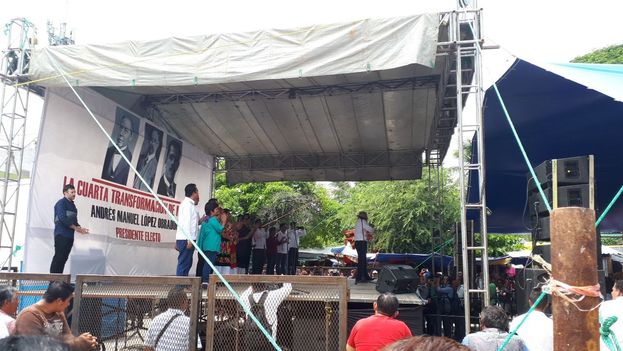
![]() 14ymedio, Yoani Sanchez, Havana, 4 December 2018 – Nobody had to tell me about it, I was there. The sun pricked my skin in Juchitán de Zaragoza, Mexico, a town still half destroyed by the earthquake that just a year earlier ravaged the region. Andrés Manuel López Obrador arrived to give a speech, but not everyone in the audience applauded or seemed to believe his promises. Some shouted clear and harsh slogans: “Out of the Isthmus!” (of Tehuantepec), they yelled.
14ymedio, Yoani Sanchez, Havana, 4 December 2018 – Nobody had to tell me about it, I was there. The sun pricked my skin in Juchitán de Zaragoza, Mexico, a town still half destroyed by the earthquake that just a year earlier ravaged the region. Andrés Manuel López Obrador arrived to give a speech, but not everyone in the audience applauded or seemed to believe his promises. Some shouted clear and harsh slogans: “Out of the Isthmus!” (of Tehuantepec), they yelled.
That day, when by accident Amlo – as the president is known in Mexico – and I crossed paths, I thought I would find a passionate flood of his supporters but it was not like that. In fact, in Oaxaca there was talk of “the betrayal of Obrador,” the about-turn he had made between his campaign to reach the presidency and the gestures he made after being elected. One could already sense disenchantment and frustration over the contradictions that were beginning to show.
Schooled in the oratory of populists, that day I sensed in his discourse the haughty turns of language used to seek applause and call from the audience a response more devoted than reflective. I remember hearing him say that he would build “concrete roads” and that he would make the area an “industrial park.” He talked about employing everyone, raising wages and ending poverty in the area.
Noon arrived and the orator finished his speech. He quickly left through the back of the platform while the shouts against him rose from one side of the stage. I felt that I had been watching a theater performance, calculated but awkward, a professional staging that to my ears as a citizen born and raised in authoritarianism sounded familiar and dangerous.
On December first, the man I heard speaking in Juchitán de Zaragoza was sworn in as president of Mexico. On his shoulders he carries the hopes of millions who elected him, tired of traditional politicians, corruption and the scourge of insecurity. For them, Amlo is a wager to achieve healthy institutions, develop social programs that improve the lives of many Mexicans, and present an adequate response to violence.
Although his term is just beginning, it is easy to venture that he will not be able to fulfill so many promises, in part because some of them are completely chimerical. Others he will achieve at a cost harmful to the nation, appealing to the practices of patronage and accumulating too much decision power in his hands, under the justification that it makes everything more expeditious or better. The greater risk is that he ends up devouring the institutions with his person and that he swallows up the imperfect Mexican democracy under the pretext that the country needs a profound renovation.
Certain visions of a personality cult are beginning to emerge in Amlo’s Administration. Public mobilization rallies, during which the president uses words to hypnotically develop his theme, had already become part of his way of governing even before he donned the presidential sash. His followers do not admit criticism, he evades answers when questioned and his relationship with the press is beginning to get testy, especially when he treats reporters as children or kisses a journalist to avoid an uncomfortable issue. He presents himself as the redeemer of a nation, and expects in return the unlimited veneration of Mexicans who will give him their absolute confidence to resolve the national wrongs.
His obstinacy, which undoubtedly attests to the several attempts he made to reach Los Pinos, can be a virtue when the time comes to apply solutions, but also a double-edged sword that leads to the most ferocious voluntarism. It will be a challenge for his ministers and closest officials to maneuver with this human whirlpool, a man who believes he has the answers to all the problems and knows how to resolve each quagmire.
For now, the first “Amlo effect” that Mexicans will have to deal with is polarization. That confrontation that settles in society and threatens to sit at the table of every household. The half measures are over, now one can only applaud or reject his management, a dichotomy that undermines the healthy debate and moderation that public discourse in any democracy needs.
Confusing the nation with a Party, the homeland with an ideology and the people with a man, as has happened in the sad case of Cuba, has devastating consequences for citizen sovereignty, the independence of institutions and freedom of expression. That one individual stands as the savior of millions of people should scare us as much as coups d’état. They start by distributing perks and end up locking us in the authoritarian cage. Nobody had to tell me, I’ve lived it.
_____________________________
The 14ymedio team is committed to serious journalism that reflects the reality of deep Cuba. Thank you for joining us on this long road. We invite you to continue supporting us, but this time by becoming a member of 14ymedio. Together we can continue to transform journalism in Cuba.
